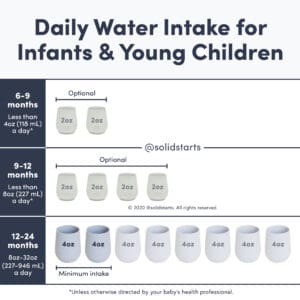Contents
What water for babies?
Water makes up up to 75% of an infant’s body. It is vital for the functioning of the organism, because it is part of the composition of the blood (it contains more than 95% of it) and of all the cells. Its role is essential: it helps to cleanse the body of its waste. On the other hand, it hydrates the body, which needs it badly: when it is not enough, Baby can be unusually tired. So don’t wait and give your little one a drink.
Infant’s water needs
Before 6 months, it is rare to have to hydrate your baby with a water supplement. Breast or bottle, your child finds all the necessary resources in his milk. However, in the event of a heat wave, fever (which increases sweating), vomiting or even diarrhea (which represents a great loss of water), you can also offer him water in small quantities, from 30 to 50 ml every 30 minutes approximately, without forcing it, to increase its hydration level. Talk to your doctor, he will advise you and in some cases prescribe oral rehydration solutions (ORS) to compensate for the loss of minerals, to drink preferably from a cup or pipette if the baby has been on the breast for a short time. . After 6 months, water is not just recommended, it is recommended ! In theory, your child still consumes 500 ml of milk per day. However, at this age of food diversification, Baby often begins to reduce his milk consumption and, consequently, his water intake. You can therefore add bottles of water of 200 to 250 ml, distributed throughout the day. If he refuses it, no problem, it’s just that he’s not thirsty! To familiarize him with this novelty, do not introduce sweet drinks or syrup. It is imperative to educate your child about the neutral taste of water, otherwise you will be constantly confronted with refusals and will create bad eating habits in him.
Bottled or tap water for Baby?
To prepare the baby’s bottle, it is recommended to useweakly mineralized water. If you choose spring water or bottled mineral water, to make the right choice, only refer to brands that say “suitable for infant feeding”. Depending on the quality of the water tables in your place of residence and the condition of common but also private pipelines, tap water may be recommended by your doctor to make the bottles, if the latter does not contain too much sodium and nitrates. Tap water sometimes amounts to 50 mg / l of nitrates, whereas this rate should be less than 10 for an infant. Too much nitrates is a sign of pollution. In the body, nitrates quickly turn into nitrites, which then pass into the bloodstream and attack red blood cells. To ensure the quality of your tap water, do not hesitate to contact your town hall, the Water Agency or the Regional Health Agency on which you depend. Unless contraindicated, it can be drunk by children over 6 months old, or even before. If you decide to give it to him, draw some cold water, letting it run for about a minute. Cases of severe poisoning due to the presence of lead in the pipes are rare, but you might as well remain vigilant. Finally, serve the water at room temperature rather than refrigerated. Drinking very fresh, even in summer, does not quench thirst more and may cause digestive disorders (diarrhea).
The water needs of children from 1 year old
As your child grows older, he needs to drink more. From 1 year old, their daily needs are 500 to 800 ml of water.. That said, don’t worry, your child knows how to regulate his water intake. And don’t forget: water is also present in solid foods, so meals cover part of its needs. Be careful, however, a plate of carrots does not replace a glass of water! Conclusion, from 2 years old, “drinking water” must have become a habit. Some parents whose children are reluctant use roundabout methods. This is the case of this reader, Véronique: “My daughter, Manon (3 years old) sulked every time her bottle of water. She always preferred fruit juice. I finally succeeded in familiarizing her with water by offering her to drink through a funny straw! ” In the park, for example, where our children exercise a lot and therefore need to hydrate, always have water in your bag. Because before 3-4 years, toddlers do not yet have the reflex to ask for a drink and it is up to you to think of H2O for them.










